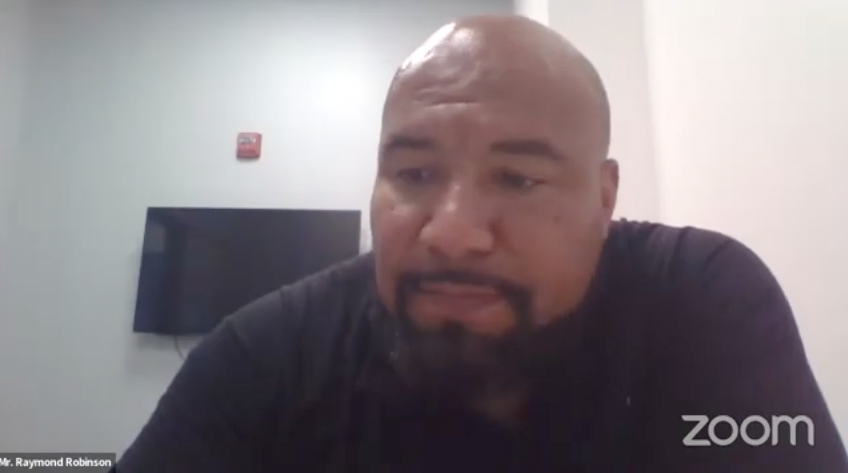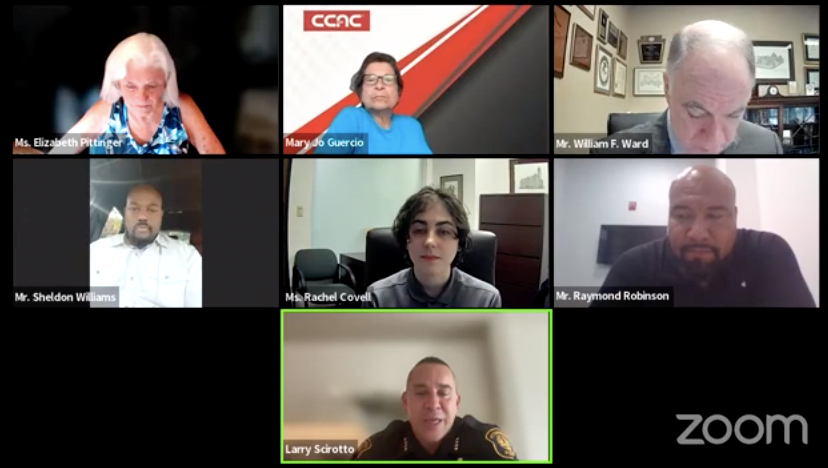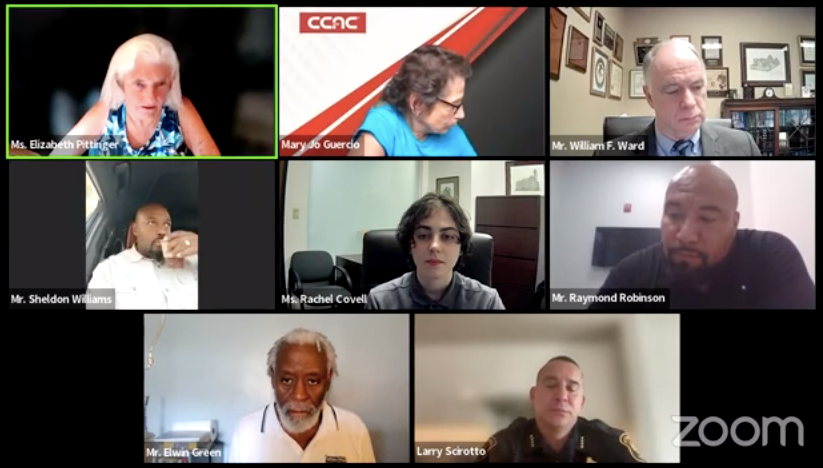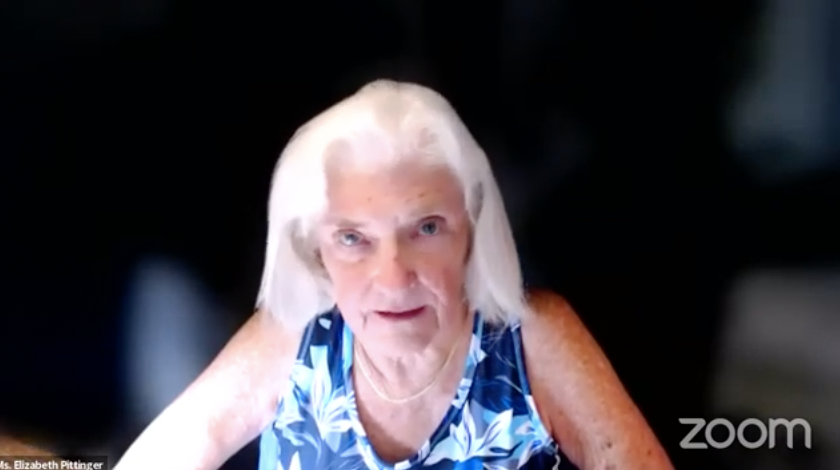Post by Nigel Parry. The Board Meeting Blog is an unofficial citizen record of the meetings and does not reflect any official CPRB position or policy, and is simply offered as a quick way of keeping up with what happens at the board meetings. Watch full-length video recordings of all CPRB meetings at cprbpgh.org/for-public-record/video/
EXCUSED: Ms. LeKeisha Brown (City Council Seat #1: Non-LEP*); Ms. Karen McLellan (City Council Seat #2: LEP)
The meeting had quorum, although one member may need to leave later. Minutes from the previous June meeting were approved.
Mr. Larry Scirotto, who used to be the Assistant Chief of Police in Pittsburgh, has been appointed the 55th Chief of Police and joined the meeting. CPRB has had a good relationship with Chief Scirotto to date, and he has been an officer for 23 years. He was sworn in as the new Chief of Police on June 8th, so this is his second month of leadership.
The Chief reiterated his pledge to be as transparent as possible with the Board and all other relevant City bodies and departments, as well as with community groups.
“We have an obligation, we have an opportunity, to make this partnership maybe something different than it’s been in the past,” the Chief told the Board, “From policy design, to strategic initiatives, to training, there are many various opportunities for us to liaise in a real meaningful way that serves the community best, and in that I stay committed to participating in any meaningful way that the Board desires that you think is impactful or meaningful.”
“This is a relationship and this partnership I think can thrive,” he continued. “We’re all committed to the same goal, which is a professional bureau of excellence in policing that serves our community in the best way.”
Board member Mr. Sheldon Williams thanked the Chief for attending, adding “I’m certainly glad that you were selected and I say this in the presence of this Board. We’re familiar with each other. It’s because of how you’ve carried yourself throughout your whole career, both being just a police officer in the ranks and even as you begin to climb the ladder through promotion, you stay consistent.”
“Being chosen as Chief,” Mr. Williams noted, “some people may have opinions about you, I have a favorable one. We went through a whole lot, throughout the years with the Pittsburgh Police, where we had not so pleasant perspectives about the Pittsburgh Police Department and then addressing issues so that we would have better accountability and trust with the public…”
“My question to you is,” continued Mr. Williams, “and it’s good for the public to hear too, what steps do you see you will be taking to assure the public that there won’t be any regressive steps back towards some of that conduct [in the past]?”
“I think twofold,” Chief Scirotto replied, “One is that we will start providing quarterly reports on all processes. Use reports, search and seizure, traffic stop data. That we are as transparent on data, all the data that we hold that we’re allowed to transmit to the public, so there are no secrets here. You’re not waiting for the yearly report to see a snapshot of the Bureau and its engagement with the community, so you that can stand pretty confident about it it, reviewing what our actions are on a quarterly basis, to speak to the groups that you represent… so that there aren’t any surprises and, more importantly, that way they and you can challenge anything that they or you see of concern.”
“Once I get through these promotions and picking my leadership team,” the Chief continued, “next will be a community advisory board. It will be members of the community, maybe members from your Board but I’m not sure if it’s of any benefit for somebody from your Board to be there… there may be more benefit for members of the community to sit there in that space… they’ll have the same access that you all have in those initiatives. Community should drive what they do and if I believe that, we should engage them in a meaningful way.”
Executive Director Elizabeth Pittinger asked the Chief to expound on the issue of the proposed community advisory board having the same access to information as CPRB does.
The Chief talked about the time he was working as a police officer in Florida, where an option existed for juvenile misdemeanor crimes to be redirected, so youth could be offered social services instead of receiving a criminal record. He noted that this was born out of a similar community advisory board. The community advisory board discussed issues such as traffic stop data and traffic stops in marginalized communities, teaching officers to make informed decisions from data and their own judgement, instead of conducting “fishing expeditions”.
“This gave credibility to our message—that the community had a say in our strategic initiatives, in our processes, in our policy development, in our training…” said the Chief.
“They had a seat on our hiring panels, not just a seat but a meaningful influence in that decision making process, sometimes to the dismay or objection of our bargaining unit but I still felt it was a worthwhile fight, a worthwhile argument to be had, that it mattered. It gave the community an opportunity to see what would have been a secretive process otherwise. They could go back to the community with confidence about how we promoted people, how we hired people, and that’s the transparency I speak to.”
“I want us to be very careful and cautious about undermining the purpose and the mandate of this Board,” Ms. Pittinger responded. “If you were to read through [our mandate]. If you were to read through that, the role of the review of policy, procedure, recruitment, hiring, training, discipline, etc., is specifically authorized and that is what the Board is supposed to do, and how we build in [the role of a community advisory board] into your idea will be important as we go forward…”
“We’ve had that kind of problem internally [with the City]. Over the years, the police administration, sometimes guided and directed by the executive administration, was not as forthcoming and transparent with this Board as the charter and ordinance expected and so we’ve had changes in the charter, and in 2020 the most recent referendum to amend the charter for this board passed with over 73 percent of the vote which was really directed at the administration, [emphasizing that it] must cooperate with this Board to the maximum extent.”
“These things that come up in ordinances and the charter usually come about because of resistance of some kind,” Ms. Pittinger continued. “We do not anticipate that with you Chief and we can work together on the development of these things, and that would include your community advisory board, understanding that there are things that are reserved to this board that cannot be delegated by anyone.”
The Chief outlined a new piece of tracking software already with secured funding and being implemented by the Office of Municipal Investigations—IAPro—that functions as an early warning system for officer behavior, both bad and good.
Ms. Pittinger raised the issue of how leadership training and professional development is conducted, and how the CPRB has been trying since last November to obtain more information.
The Chief said he was able to share the outline of the training but was unable to share specific details of what was in it yet.
Detail is the destination that the Bureau is trying to move towards, so that there are clear guidelines that are “plug and play”, which can be handed to anyone to review. At the moment, what is available is not yet as granular as individual modules, as many people are involved in training and there is not a single, detailed document in existence. The Bureau is moving towards a situation where the various modules offered by different instructors will be available for review.
Regarding the police staffing report, released last week to some controversy, the director reiterated that CPRB is ready, willing, and able to assist with an outside view and any help, consistent with its mission.
In 2004, after the conclusion of the Consent Decree, the community wanted to codify the decree, which was not practical as the decree contained specific measures to address specific issues that existed at that time. In 1997, then Councilwoman Valerie McDonald-Roberts had sponsored an ordinance that required the Pittsburgh Police to become accredited.
There were two options at that time, the national Commission on Accreditation for Law Enforcement Agencies (CALEA) which was very expensive and impractical given the City’s financial difficulties at the time, and the Pennsylvania Chiefs of Police Association introduced the Accreditation Program. The latter became the option that CPRB recommended pursuing to assure the community that there were appropriate and consistent standards.
In 2011, Chief Nate Harper led the efforts to do this, and in 2014, the City continued to pursue the Pennsylvania Law Enforcement Accreditation Commission track. A conflict between City and State motor vehicle codes caused an issue that would have left the City in violation of the State code. The City Council remains the body that can resolve the accreditation issue and CPRB will continue to follow up.

Mr. Raymond Robinson raised the issue of the Community Engagement Unit from the recent report, asking if it were realistic for another 40 officers to join it as stated. The Chief responded that he was committed to continuing this track, working to tweak the work.
Quorum was lost at this point, meaning that the case action agenda could not be discussed. Cases already under investigation continue nonetheless.
Executive Director Elizabeth Pittinger gave her report, noting that the number of complaints, year to date, is 139 as of yesterday.
Ms. Pittinger began with news that CPRB Board member Ms. Karen McLellan had submitted her resignation effective July 1st, to move closer to family. Ms. McLellan had served the Board since January 2013 as a Council-designated law enforcement professional. She was the successor to Deborah Walker in Council seat #2 and was one of the early crisis intervention team members. She has been a tremendous asset to CPRB.
Two new personnel appointments were announced. Ms. Sherry Bridget, who has worked as a CPRB investigator for 15 or 16 years, has been appointed as CPRB’s Community Liaison and will become CPRB’s roving representative and community advocate as of July 31st.
A new administrative assistant, Da’Mesha Carpenter, will begin on August 7th. A graduate of Alabama State University, Ms. Carpenter has a BA in Political Science with a minor in Legal Studies and served as an intern in CPRB’s office in 2019. These positions were filled ahead of schedule, originally estimated to be in September.
Ms. Pittinger talked about how she feels Chief Scirotto is coming in with “a very contemporary mindset and approach” to “the huge undertaking” of his job as Chief. He has considerable experience and, as a previous Assistant Chief of Police in Pittsburgh, he structurally understands the organization. In Ms. Pittinger’s opinion, all of this leaves the City “in a good spot.”
After her report, Ms. Pittinger raised the issue of Chief Scirotto’s proposed community advisory board. “We have to be careful that there’s not an inadvertent undermining of [the CPRB] Board,” additionally raising the issue of what role the existing public safety councils will play, going forward. The fact is that the CPRB is already a board selected from the community and has a codified mandate from the Pittsburgh electorate.
The issue of CPRB’s outstanding and unfulfilled request to see police leadership training materials, discussed at previous meetings and with Chief Scirotto earlier at this meeting, was again raised. It was expressed that CPRB should request the “outline” that the Chief discussed, even if specific modules are still under development. It was generally decided that it was not necessary to pursue the subpoena already agreed on by the Board.
Ms. Kate Crawford spoke from the Zoom audience about her experience in Shaler Township, regarding an officer who behaved inappropriately, forcing unwanted interactions with her family that included intimidation at family hearings, and the Township’s response to communications. She had previously spoken at an April CPRB meeting. Shaler is outside of CPRB’s geographical area of jurisdiction.
There was no other business.
Please browse CPRB’s Case Action Agendas here for case-related documents and information: https://cprbpgh.org/for-public-record/action-case-status-reports
The next CPRB Board meeting will take place on September 26th, 2023 at 6pm ET. Check our meetings page for links to agendas, draft and approved minutes, current case actions, meeting video, and other documents.
Post by Nigel Parry. The Board Meeting Blog is an unofficial citizen record of the meetings and does not reflect any official CPRB position or policy, and is simply offered as a quick way of keeping up with what happens at the board meetings. Watch full-length video recordings of all CPRB meetings at cprbpgh.org/for-public-record/video/.




